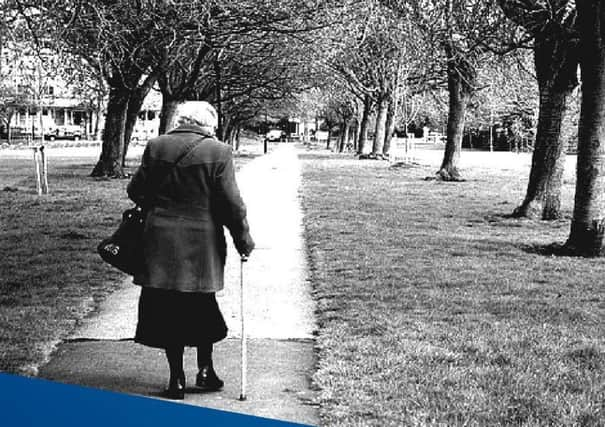Police launch scheme to trace dementia patients in East Dunbartonshire


A further 20 elderly people have been reported missing by their carers of family.
The shocking figures were revealed at a recent seminar, hosted by police.
Advertisement
Hide AdAdvertisement
Hide AdNow a scheme, which helps to trace people with dementia, has been launched locally by officers, who say it will be invaluable “when every second counts.”
“The Herbert Protocol”, which is already used in other parts of the country, sees carers and family members provide police with personal information in advance, which could save valuable time if a person is reported missing.
The file on dementia patients will not be kept by police but will be held by family or a nursing home in an agreed place.
At the local seminar attended by health and social care agencies, Sergeant Mick Miller from the Missing Person Co-ordination Unit, said: “People may be shocked to learn that in the past year in East Dunbartonshire over 80 vulnerable older people were found in the street confused after leaving their home. Furthermore almost 20 vulnerable older people were reported missing in the area.
Advertisement
Hide AdAdvertisement
Hide Ad“Through a mixture of hard work and good luck they were all found safe and well but there have been tragic conclusions to incidents in the past.”
East Dunbartonshire Police Chief Inspector Gerry Corrigan is determined to see the Herbert Protocol succeed in East Dunbartonshire.
He said: “I am confident our strong links with partners in the area will lead to a significant uptake of this invaluable tool.
“Through hard work and education we will work towards people signing up to the protocol as soon as possible after initial diagnosis.
Advertisement
Hide AdAdvertisement
Hide Ad“In doing so, it will lead to us receiving the most accurate information possible.
“I will announce a date in the near future for the official launch of the protocol within the community, giving people to chance to sign up to the protocol and for us to answer any questions or concerns they might have.”
Sergeant Miller added that the first hour of any missing person investigation is crucial and the quicker the police can obtain vital information the better chance there is to locate the missing person safe and well.
He said: “This is where the Herbert Protocol comes into play. Working together with all available partners, a form will be forwarded to any individual or the family of someone with with a dementia-related illness to record key information along with a recent photograph in the event they are reported missing in the future.
Advertisement
Hide AdAdvertisement
Hide Ad“The form would then be kept in a safe place within the person’s home address so it can be updated and easily accessed by police.”
He gave examples of vulnerable elderly people going missing and travelling to childhood homes, old places of work or simply riding on the same bus route all night.
Sergeant Miller said: “Using the Herbert Protocol would have led to officers being made aware of these habits immediately, allowing for a quick and successful conclusion.”
The seminar was arranged by Kirsty Kennedy, adult protection co-ordinator for East Dunbartonshire.
Advertisement
Hide AdAdvertisement
Hide AdPartners from the Health and Social Care Partnership, East Dunbarton Voluntary Action, East Dunbartonshire Council and many others all attended with the common goal to improve information sharing to protect older adults who go missing.
Anyone wishing to sign up to the Herbert Protocol can access the form on the Police Scotland Internet site.
Any local organisations interested in receiving more information can contact the police local authority liaison officer for East Dunbartonshire via email at [email protected]
It is estimated that the numbers of people with dementia will double by 2030.
Advertisement
Hide AdAdvertisement
Hide AdJim Pearson of Alzheimers Scotland, said he welcomed the move but that the protocol needed to be used with the consent of patients.
He said: “It means that information is already there and exists so if that person does go missing, the police aren’t wasting precious time.”